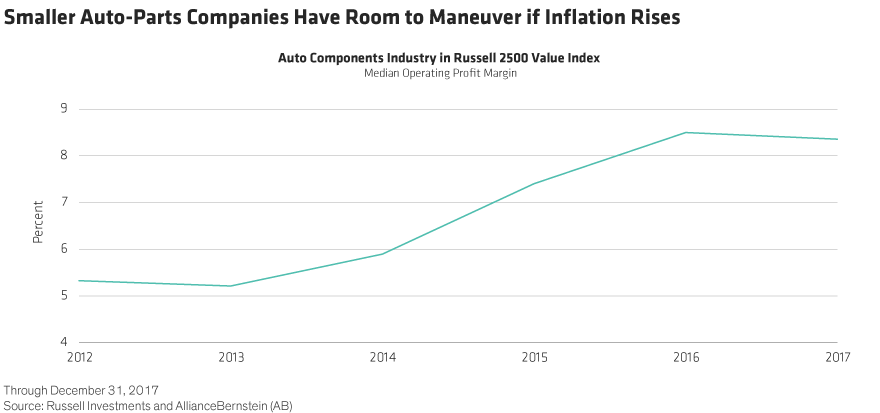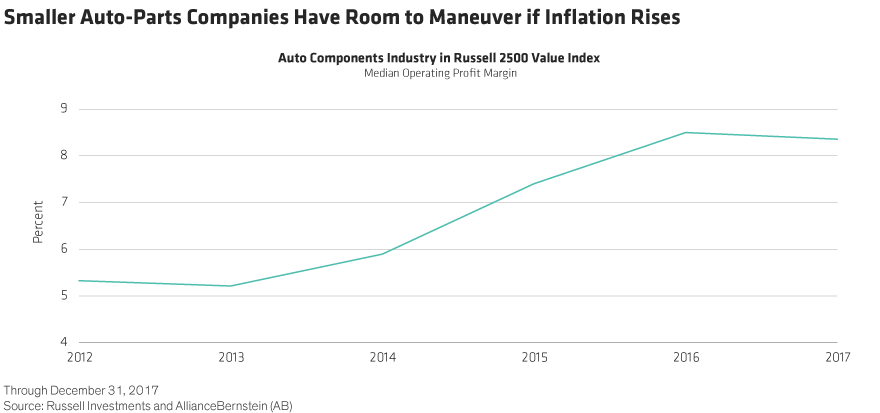by Equities, AllianceBernstein
As concerns about inflation spread, it’s time to gauge how different types of stocks will respond. Smaller companies in niche markets may be better positioned to cope with rising prices—especially in consolidating industries.
Inflation has been subdued for so many years that many investors have forgotten how rising prices factor into stock performance. But much has changed over the past decade. The types of companies and industries that once helped hedge against inflation may not do the job this time.
Brands No Longer Protect Against Inflation
In the past, when inflation surfaced, investors typically flocked to companies with goods and branded products of higher added value. The idea was simple. Companies like these could more easily pass rising prices through to loyal consumers, who would pay up for quality and preferred brands.
Industries in which companies all offered a similar product and competition was intense were shunned. Companies such as airlines and auto-parts manufacturers would have a tougher time charging consumers more for their products. As input costs rose faster than revenue, their profit margins would get squeezed.
The Cheerios Challenge
General Mills’s recent experience has challenged some of these assumptions. In March, General Mills warned that its operating profit was under pressure from “sharp increases in input costs, including inflation in freight and commodities.” In other words, the company’s iconic brands—including Cheerios breakfast cereal and Häagen-Dazs ice cream—provided little protection from rising costs. Why? Because today’s consumers are less willing to pay up for brands in a world of discount supermarkets and an increasing array of cheaper, unbranded private-label products to choose from.
In contrast, industries such as auto parts have been more effective in responding to wage pressures. Massive consolidation over the past 10 years has seen companies shift manufacturing to lower-cost countries, as demand increased for increasingly complex parts and systems. As a result, profit margins have been increasing for the group (Display) as large auto companies are using more and more value-added content in vehicles—and have fewer alternatives to choose from.

New Playbook for Inflation
These examples should help investors begin to create a new playbook for investing in a reflating world. Investors should look for companies that are better positioned to pass rising costs through to customers. And industries that have gone through restructuring and consolidation are good places to hunt for inflation-resistant holdings.
Small-cap companies are a good place to start. Many small-cap companies operate in niche markets and can show earnings growth driven by favorable supply/demand dynamics of their industries, leaving them relatively insulated from broader macroeconomic inflationary trends.
Auto Parts and Airlines Are Well Positioned
Take the auto-parts industry, where consolidation has left companies better positioned to manage supply and pass through rising costs. Small- and mid-cap auto-parts manufacturers have moved up the value chain in recent years because the increased complexity of auto parts has made their niche products indispensable to major auto manufacturers.
Small- and mid-cap airlines are also well positioned to cope with inflation, in our view. In the past, periodic spikes in labor and fuel costs would crush airline profit margins. But major consolidation in recent years has significantly reduced the number of airlines competing for each passenger on a specific route.
While they do face occasional forays from larger airlines into their markets, smaller-cap airlines have benefited from consolidation. They enjoy greater market share in their niche markets as the major airlines focus on longer and international routes.
The threat of inflation can no longer be ignored. But the old playbook for investing in an inflationary world may be obsolete, in our view. Small-cap stocks provide investors with a wide range of opportunities in lesser-known companies that should be able to weather pricing pressure and deliver solid returns as inflationary conditions surface.
The views expressed herein do not constitute research, investment advice or trade recommendations and do not necessarily represent the views of all AB portfolio-management teams.
Copyright © AllianceBernstein














